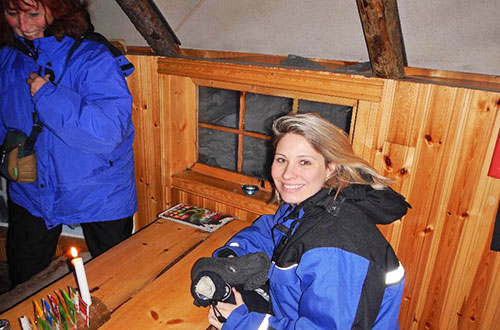When and how did you first learn about
digital nomads?
It was actually at a conference in Manila, Philippines where I
met Bernard Vukas, a talented Croatian freelance
developer who works via oDesk for global clients, often from
beach towns on his laptop.
As I traveled to more cities -
Sydney, Dhaka, Berlin - I met more digital nomads, many of whom
know and support each other.
There's truly a global community of
digital nomads, with online and offline meetups to boot.
Why did you decide to become one?
When I graduated from college, I was determined to live and work
abroad but I wasn't sure how to turn that lifestyle goal into a
career path.
That was ten years ago and
high-speed wireless Internet wasn't pervasive enough in my
bucket-list destinations to put in an efficient work day online.
So, I explored the standard routes -
Peace Corps, multinational nonprofits - and eventually landed in
Ecuador with my boyfriend (now husband) teaching English at a
community school in the Andes with
WorldTeach, a non-profit,
non-governmental organization founded by a group of Harvard
University students.
I found it energizing to pare back
my life to only what would fit in a few hiking bags.
At night and on weekends, I learned
how to make
guanabana ice cream in a spinning copper pan,
bargain with grumpy taxi drivers in Spanish, and dance to live
bands playing woodwind instruments I didn't know existed.
Those on two-week vacations or three-day business trips rarely
encounter these experiences, even with help from local contacts
and a lot of planning.
For a travel junkie like me, it's
tough to rely on a brief change of scenery during an annual
vacation to sustain me throughout the year.
It's also tough to forego a
hard-earned career in marketing to open that beachside B&B that
sounds like such a good idea until I have to get breakfast on
the table and wash ten sets of sheets as a typhoon rolls in.
How did you learn how to do it?
What resources did you access?
Many of my friends are avid travelers.
Some have even paused their careers
to travel for weeks or months. However, few have adopted a true
digital nomad lifestyle of working via the Internet as they
travel.
For example, friends of friends are
traveling by train for an entire year and writing a blog about
it for fun. Another friend from high school quit her online
marketing job at a huge e-commerce company to photograph her
travels for a year.
A third friend went on a paid
sabbatical abroad after clocking in five years at her company.
I've extracted a lot of advice from travel blogs, many of which
focus on personal growth through storytelling or chronicle a
journey via
Instagram, but I've had to assemble the more
practical advice myself.
I wanted to share a few quick hacks
that have saved me time and frustration.
How did you choose a location for a
base?
I'm a digital nomad with a full-time job for a company that
moved me to London, so that's my temporary base.
When I'm in London, I work at
TechHub, a coworking space within Google
Campus. London has a fast-growing tech startup
ecosystem and is also a great jumping-off point for travel to
other European tech hubs like Berlin, Amsterdam, Paris, and
Dublin.
This week I'll be in Oslo. Next (NXGPY
+%) week I'll take the Eurostar train to Paris while working en
route.
Whenever possible, I work from accelerators and coworking
spaces. They usually have reliable Internet and printing
facilities, and it's fun to learn about nuances between cities
by chatting with the resident entrepreneurs. Best of all, local
founders can tell you where to get the city's best (and
cheapest) cup of local coffee.
One of my digital nomad credos is stay in a local home whenever
possible.
I typically use
Airbnb so that even
if I have a long work day, I can still get a feel for a
neighborhood during my lunch break or a late dinner. I try to
avoid chain hotels and restaurants, and commercial shopping
districts, at all costs.
If a restaurant has an
English-language menu out front (outside of English-speaking
countries, of course), I keep walking.
What have been the biggest
challenges or frustrations?
A consistent high-speed Internet connection.
Even in London, you'd be surprised
how frequently my connection goes down. Video calls are crucial
to be able to read people's faces and body language during
meetings. Without video calls, I feel much more isolated.
I have also racked up a lot of foreign transaction fees at ATMs.
Getting a local bank account in many countries is a nightmare.
Scheduling can also be rough.
My boss has been amazing about
scheduling team meetings first thing in the morning for the
California folks so that I can join. With others outside my
company who are less accommodating, I've had to set boundaries.
I work longer hours than in the
U.S., but without the commute, it nearly evens out.
Any downsides to being a digital
nomad?
I've missed some key milestones in the lives of friends and
family back home, which can cause feelings of selfishness and
guilt. I'll need to do my best to make up for missed birthdays,
weddings, holidays, and baby showers when I get back to San
Francisco.
What has been the most rewarding
aspect?
Being a digital nomad is the best of both worlds:
I get
inspiration and levity from new environments while furthering
the marketing career I'm working hard to build.
I'm very lucky to be at a company that affords its employees
work freedom. oDesk really believes that work is no longer a
place.
A paradigm shift is occurring:
companies who want to attract
and retain employees need to embrace work flexibility.



